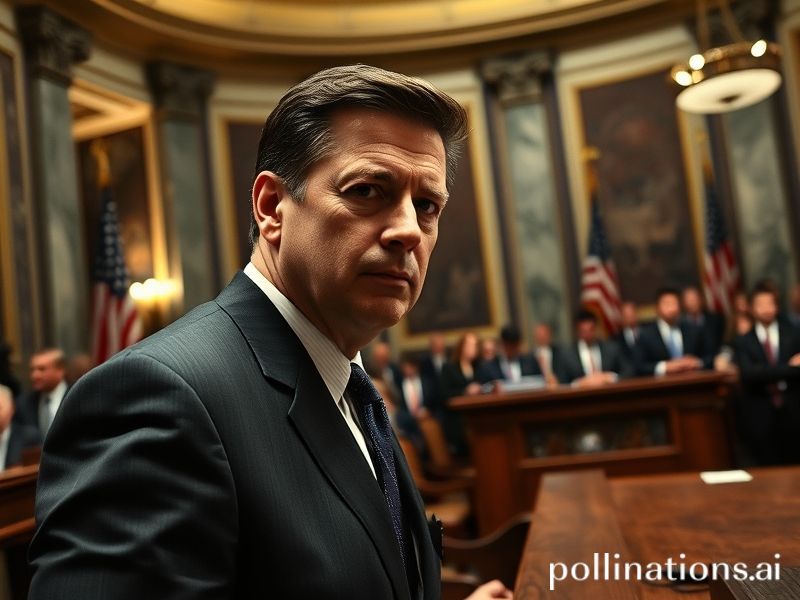James Comey: The Bureaucrat Who Became the World’s Favorite Political Punchline
James Comey: The Man Who Made Bureaucracy a Global Spectator Sport
By Our Man in the Cheap Seats, Watching the World Burn
PARIS—In the grand tradition of international intrigue, few things are as reliably entertaining as watching a tall, earnest American ex-FBI director wander the planet like a remorseful giraffe, signing books and explaining—again—why he thought reopening an investigation eleven days before a presidential election was a perfectly sensible idea. James Comey, once the most powerful G-man on Earth, now occupies a uniquely modern role: part cautionary tale, part airport paperback, part geopolitical Rorschach test. From Brussels to Bangkok, people who have never set foot in Iowa now trade opinions about his judgment as if it were Champions League football. Humanity, it seems, enjoys nothing more than outsourcing its own fiascos to one lanky lawyer with a Twitter habit.
The global fascination is easy to mock yet impossible to dismiss. In South Korea, political talk shows splice Comey’s congressional testimony into K-drama parodies—because nothing heightens the stakes like slow-motion replays of “Lordy, I hope there are tapes.” In Nigeria, WhatsApp groups circulate memes comparing him to the central bank governor who “just felt like” redesigning the currency three weeks before an election. Even the French, who normally reserve moral panic for unpasteurized cheese, have adopted “faire un Comey” as shorthand for any self-defeating act of institutional transparency. Linguistic drift is the sincerest form of international admiration.
Comey’s broader significance, if one is feeling generous, lies in how neatly he embodies the post-2016 West: morally self-certain, legally meticulous, and catastrophically unready for social media. His memoir—“A Higher Loyalty,” a title that practically begs for a Bollywood dance remix—has been translated into thirty-odd languages, including Serbian, where the phrase “ethical leadership” now triggers involuntary laughter in finance ministries. Foreign diplomats, weary of explaining their own domestic chaos, love to invoke him as proof that the Americans, too, can turn procedural minutiae into existential crisis. Schadenfreude, like oil and opium, remains a growth industry.
Yet beneath the snickering lies a darker truth: the entire planet has skin in the Comey game. When the FBI sneezes, emerging markets catch cold; when Washington spends two years debating whether a laptop full of emails constitutes a national emergency, supply chains in Vietnam shudder at the uncertainty. Central bankers in Zurich, already jumpy after Brexit, watched the 2017 firing saga with the glazed terror of a man realizing the pilot is arguing with air-traffic control on Instagram Live. Rule-of-law fetishists from Warsaw to Pretoria once held up the United States as the gold standard; now they use Comey’s roller-coaster career as a teachable moment on how institutional safeguards can be stress-tested to death by cable news chyron.
International lawyers, a profession that drinks cynicism for breakfast, have dissected his decisions like medieval scholars parsing angels. The consensus: Comey didn’t break the law so much as weaponize ambiguity, a maneuver now studied in Beijing as “lawfare lite.” Meanwhile, authoritarian regimes—from Ankara to Caracas—cite his fate as evidence that even in democracies, security chiefs who displease the sovereign end up selling books on tour. The propaganda practically writes itself; all it cost Washington was a few points of global credibility and the last remaining shred of bipartisan comity.
Of course, Comey himself remains serenely upbeat, insisting in lecture halls from Sydney to Stockholm that truth eventually outs. Audiences nod politely, then queue for selfies, quietly calculating the exchange rate between truth and midterm elections. The world has moved on to newer crises—pandemics, inflation, the slow-motion implosion of Twitter—but Comey lingers like a recurring dream, the ghost of procedural propriety reminding us that institutions, like middle-aged joggers, can collapse mid-stride while insisting they’re just catching their breath.
In the end, perhaps that is his true international legacy: proof that even the loftiest norms can be memed into absurdity, and that the real global lingua franca is not English but incredulous laughter. Somewhere in a Davos after-party, a hedge-fund manager is raising a glass to him. The toast? “To James Comey—who taught us that in the 21st century, the only superpower stronger than America is its capacity to turn its own virtue into a punchline.” Cheers, Director. The world needed the laugh—even if it came with side effects.







